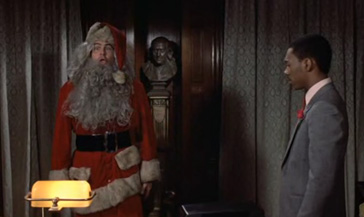Viking Night: Trading Places
By Bruce Hall
December 31, 2013
BoxOfficeProphets.com

The Dukes’ most trusted advisor is Louis Winthorpe III (Dan Aykroyd), the snooty, ambitious but devoutly loyal manager of Duke & Duke investments. Louis is rich, handsome, and has lots of rich and handsome friends. He is also about to marry a girl who looks like every Victoria’s Secret model smooshed into one. Winthorpe and his money grubbing masters make money hand over fist during the day, and spend their evenings at the country club chortling over whiskey sours about how poor people probably taste like chicken. They preside over a multimillion dollar empire that practically runs itself, and it’s paying off handsomely.
But then a vagrant named Billy Ray Valentine (Eddie Murphy) literally bumps into Winthorpe one day, and everything changes. Initially arrested for assault, Valentine is rotting away in jail, waiting for the system to come down on him when he’s mysteriously released. Apparently the Dukes believe that rich people are rich because they inherently work harder and are more motivated than their counterparts on the other end of the economic spectrum. And people are poor, of course, because they are all lazy and on drugs, and are also probably African-American. So being the competitive siblings that they are, the Dukes decide to conduct an impromptu social experiment using Valentine, who is poor and black, and Winthorpe, who is just...so totally not. The brothers concoct an elaborate scheme to discredit Winthorpe and utterly destroy his life, and put Valentine in his place.
Their one dollar wager is this: Can a rich, successful businessman be turned into an unemployed transient through severe negative reinforcement, and can a homeless person learn to run a corporation with nothing but good intentions and the right amount of moral support? Are they – and all of us, by extension – the product of our inherent nature (this would be Mortimer’s extremely racist opinion), or can anyone be motivated to great things, given the proper environment (Randolph’s view)? With the help of a surly private investigator (Paul Gleason, in his prime) and a hooker with a heart of gold (Jamie Lee Curtis, also in hers), the Dukes are playing games with real lives.
For a dollar. And all of this is against the backdrop of their attempt to make millions off an ill gotten government crop report, due for delivery on New Year’s Eve.
What will surprise you is how successfully Trading Places actually manages to weave an unexpectedly relevant social narrative while surreptitiously offering up ample doses of timely satire. I know that’s high praise for a movie whose writers (Timothy Harris, Herschel Weingrod) would later bring us Space Jam and Kindergarten Cop. But in this case, it resulted in a foundationally solid script. And as director, John Landis is well known for slipping wry sociopolitical commentary into unlikely places. Here, he again manages to stamp what might have been a very average story with his unique brand of observational humor. His scenes are full of life, and stuffed with unspoken dialogue and obscure visual cues, almost making the camera itself a legitimate part of the cast.
Speaking of the cast, the Dukes are almost excessively villainous archetypes, but they’re played with such devilish glee by two of Hollywood’s most respected actors that it’s truly a thing of beauty. Winthorpe starts out a stuffed shirt, but once he’s out from under the Dukes’ shadow his true values appear. And Murphy takes what could have been just another Quirky Black Guy role and breathes real life into it. I don’t know whether Aykroyd and Murphy were just being themselves, or were really that perfect for the roles that were written. Either way, both their character arcs are more convincing than what you’re used to seeing in a comedy. It gives the story a strong core, which raises all the boats.
That’s good, because the remaining cast members are somewhat less well defined, either by necessity or because they’re the only woman in a film written by men. Jamie Lee Curtis probably was not challenged by her role, but that’s a good thing, isn’t it? Gleason plays to type as a grim thug, and Denholm Elliott is under-appreciated as Winthorpe’s butler. They’re small pieces but each fits a larger and very significant aspect of the story - and they all have multiple memorable moments. Trading Places almost flawlessly avoids the mistake that bedevils far too many high profile comedies, which is a top heavy cast. This is truly one of those movies where everything and everyone was in the right place at the right time, and to this day it remains a true classic.
If there’s anything negative to be said I guess I could point out that despite its pretensions, Trading Places isn’t going to teach you anything real or meaningful about class warfare. Of course you shouldn’t judge a book by its cover. Of course everyone is created equal. Of course racism is wrong. Of couse inside every hooker is a mother figure trying to get out. And success is usually a combination of personal potential and good fortune (in a much less evil and racist way, Randolph and Mortimer were BOTH right). And of course, Hollywood movies are made and financed by people who for the most part are all pretty well off. Watching rich people scold other rich people for being rich feels weird to me.
But of course the difference is, in New York they just make money. In Hollywood they make money telling stories. And in the case of Trading Places, it’s a pretty damn good one.